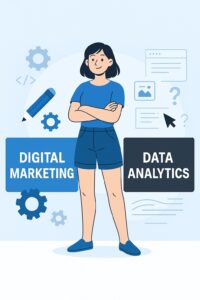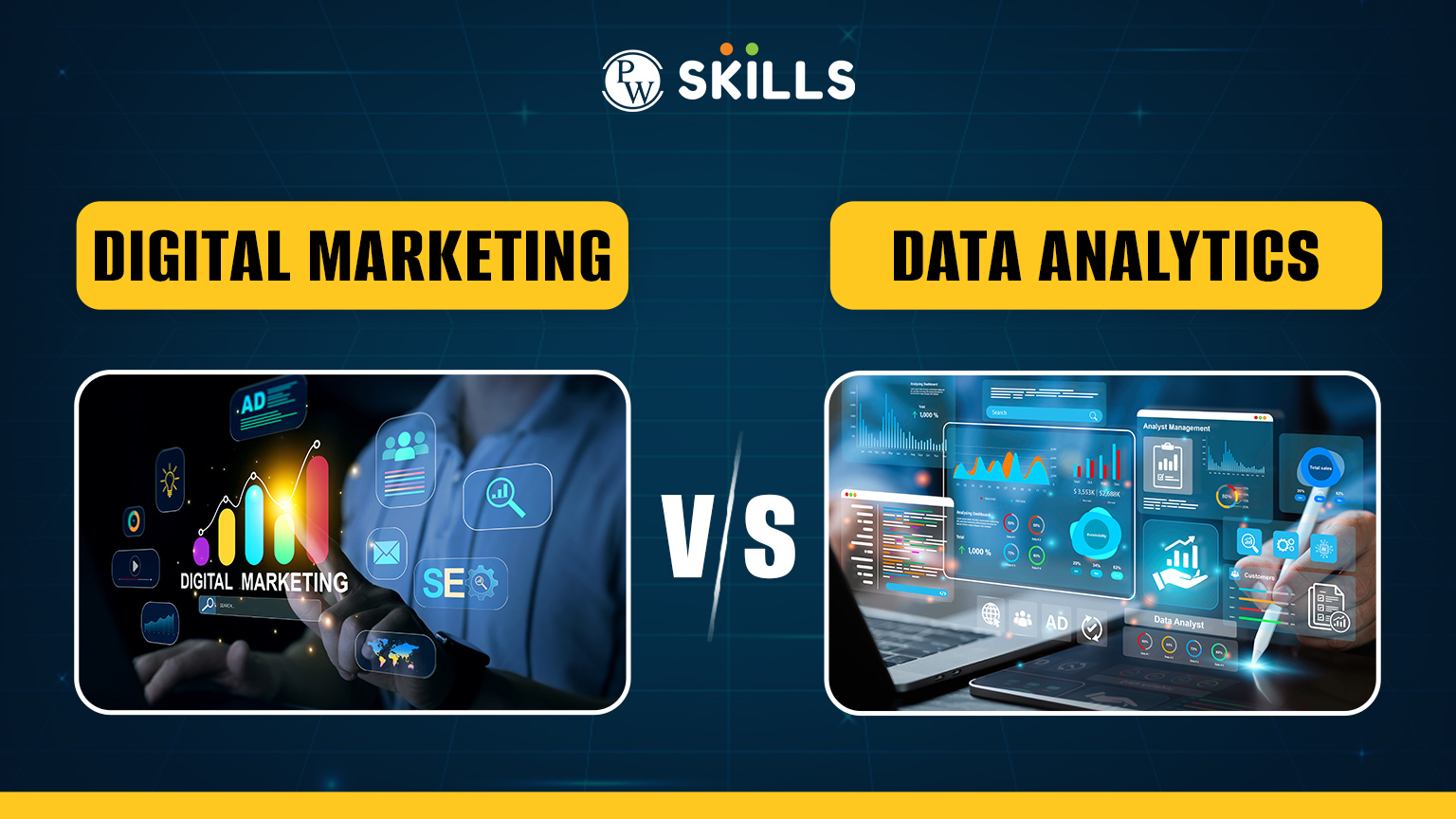Digital Marketing Vs Data Analytics – Two important movers that are worth mentioning that can bring fundamental changes to businesses and careers: . Both of those powerful fields are having demand, but which is preferable? This guide will help you understand the main differences, the benefits, and future scenarios of both fields, whether as a student deciding on a career option or as a working professional willing to get a little update.
Digital Marketing Vs Data Analytics
The comparison of Digital Marketing vs Data Analytics brings us to two of the leading professions of modern businesses. While both are key players in their growth schemes, the two fields deal with the problems in contrasting ways. Let us analyze their functions, what core functions they have, how they intersect, and why companies need both to survive.
What Is Digital Marketing?
When looking into Digital Marketing Vs. Data Analytics – digital marketing concerns reaching, engaging, and converting the audience online. It includes strategies such as:
- Search Engine Optimization (SEO): Making a website visible or ranked on Google;
- Social Media Marketing: Running ads on Facebook, Instagram, and LinkedIn;
- Content Marketing: Creating blogs, videos, and infographics to attract and inform customers;
- Pay-Per-Click Advertising: Placing ads on Google and social platforms;
- Email Marketing: Keeping leads warm by sending targeted emails.
The goal is – Build brand awareness, generate leads, and ultimately, drive sales while changing with the online trends at their pace.
What is Data Analytics?
Among Digital Marketing Vs. Data Analytics – data analytics, conversely, is the science of interpreting raw data to extract insights. Process such as:
- Collecting & Cleaning Data: Referring to gathering the right information from a variety of sources;
- Statistical Analysis: Identifying patterns and trends;
- Data Visualization: Presenting findings through dashboards (using Tableau or Power BI style tools);
- Predictive Modeling: Using ML techniques to predict activities about the future.
With the help of data analytics, businesses aim at smarter decisions to either improve supply chains, customer experiences, or even detect fraud.
How Do These Two Interact?
Digital Marketing Vs Data Analytics might seem like some separate worlds. Yet, they are much interrelated:
Marketers Use Data—Digital marketers analyze campaign performance (click-through rates, conversions), and refinements are derived on how their strategies are working.
Analysts Rely on Marketing Data—Very often, in-house data analysts would need to process customer behavior data from the website and advertisement to provide business insight.
For instance, for the low conversion of a digital marketing campaign, a data analyst could identify the cause: either it is marketing to the wrong audience or the landing page has some issues usability-wise.
Key Differences at a Glance

| Aspect | Digital Marketing | Data Analytics |
| Primary Focus | Customer engagement & brand growth | Data interpretation & decision-making |
| Skills Needed | Creativity, communication, SEO | Statistics, programming, SQL |
| Tools Used | Google Ads, Meta Ads, Canva | Python, Excel, Tableau |
| End Goal | Drive sales & brand loyalty | Improve efficiency & strategy |
Key Components of Data Analyst Roles
When it comes to Digital Marketing Vs Data Analytics, it is imperative to understand what a data analyst does. Data analytics involves much more than number-crunching; it is a multi-faceted role that joins the dots between raw data and business strategy. Here are some core components that render this profession so much sought after these days in the ever-increasing world of data.
-
Data Collection and Sourcing
Before any analysis is set forth, the first-order business is data collection from reliable sources. A data analyst:
- Will identify relevant data streams (CRM systems, web analytics, sales databases)
- Will extract data via APIs, SQL databases, or spreadsheets
- Will ascertain data quality through the elimination of duplicates and inconsistencies
-
Data Cleaning and Preprocessing
Raw data are usually messy—that’s where the real fun begins. Analysts will spend ~60-80% of their time:
- Dealing with missing values and improper formatting
- Standardization of categories (i.e., changing “NY,” “New York,” and “N.Y.” to one format)
- Finding outliers that will bias results
-
Exploratory Data Analysis (EDA)
Now, patterns start to arise. The analyst uses:
- Descriptive statistics (mean, median, distributions)
- Visualizations (histograms, scatter plots) to view trends
- Correlation analysis to see linkages between variables
-
Statistical Modeling and Hypothesis Testing
Beyond observation, analysts test the theory with:
- Regression analysis to predict outcomes (for example, “Will price drops increase sales?”)
- A/B testing to compare strategies (testing 2 different email subject lines)
- Confirming significance, so the results aren’t due to chance
-
Data Visualization and Storytelling
Insights are useless if anybody supports them. Analysts:
- Dashboards are prepared using Tableau, Power BI, etc. for real-time monitoring
- Write executive summaries with a very clear takeaway
- Tailor their presentation according to their audience (technical vs. nontechnical)
-
Business Intelligence and Strategy
At the end of the day, decisions. Analysts:
- Translate findings into actionable recommendations (“Ge,,t into that 18-24 demographic”)
- Work across marketing, finance, and operations
- Measure the effects of what change has been made
Impact Example: A Walmart analyst’s discovery of “beer and diaper” sales correlation led to strategic product placements.
-
Tools of the Trade
Basic knowledge is fine in Excel, but professionals rely on:
- Databases Quires in SQL
- Advanced Analysis in Python/R
- Version control in Git
- Machine learning (for predicting future trends on senior level)
-
Continuous Learning
With AI coming in to disrupt analytics, analysts have to remain well-versed about:
- New tools (ChatGPT for code generation)
- Privacy laws (GDPR, CCPA)
- Industry-centric advancements (predictive analytics for healthcare)
Why Does This Matter in Digital Marketing Vs Data Analytics
In Digital Marketing Vs. Data Analytics, marketing teams depend on the analytical elements to:
- Optimize advertisement spend by ROI analysis
- Personalize campaigns through customer segmentation
- Forecast sale trends so as to plan inventories
When we talk about Digital Marketing Vs. Data Analytics – digital marketers implement campaigns while data analysts build a strong foundation for these campaigns to resist the test of time.
Future of Data Analysis is Booming
The future of data analysis seems to be very bright. The companies are now looking for experts who can process complex data because with the advancement of AI and machine learning, such an audience would be able to use such technologies in their industries. Industries such as those in healthcare, banking, and retail continue to cash-in from these improved predictions to up decision-making for their business activities.
Another aspect of how the Future of Data Analytics looks bright is big data. Every click, every purchase, and every interaction on social media generates data-and businesses would use data analysts to help them understand that data. In fact, if job security and handsome salaries are what you consider, this has better prospects for the Digital Marketing Vs Data Analytics debate.
The Digital Marketing Future: Is It Still Rising?
Now let us look at the future of Digital Marketing. Of all the forms of marketing, digital marketing is the one field in which nothing is constant. The new platforms-think of TikTok and Instagram, and AI-driven ads-force marketers to keep abreast of trends.
Personalized customer experiences will be part of the Future of Digital Marketing. Now, as a result of data (from data analysts, yes), brands create hyper-targeted ads, even if SEO and content marketing are still fundamental for online visibility. If you find fulfillment in creativity, storytelling, and hustling, then digital marketing has a better shot in the Digital Marketing Vs Data Analytics puzzle.
Skills Required: Digital Marketing Vs Data Analytics
When choosing between Digital Marketing Vs Data Analytics, you can also evaluate yourself; because quite honestly, these are quite different fields. Copywriting, graphic design, and social media marketing skills are all needed under digital marketing. Statistics, programming, and critical thinking skills will be necessary under data analytics.
But there’s also an overlap. Marketers would be better informed about the data that would help their decisions, and analysts would need to know how the insights they gain are used in shaping marketing strategies. The most sought-after professionals today have nurtured both skills, thus making them an added advantage in the Digital Marketing Vs Data Analytics domain.
Salary and Job Opportunities in Digital Marketing Vs. Data Analytics
Money matters, doesn’t it? When comparing salary differences in Data Analytics vs Digital Marketing, we find that data analysts tend to have greater starting salaries (and it happens to be an in-demand technical career). However, the most experienced and highly paid digital marketers (especially those excelling in paid ads and SEO) manage to match or surpass such figures.
In terms of job opportunities, both of these fields are promising. In the Future of Data Analytics, jobs are being created in AI and predictive modelling. The Future of Digital Marketing has openings in influencer marketing and automation. The final selection is made according to whether you prefer coding or creative campaigns.
Also Read:
- The 10 Best Digital Marketing Certificates in 2025, How to Choose Right One
- Top 50 Digital Marketing Interview Questions and Answers For 2025
- The Ultimate Data Analytics Tutorial: For Beginners & Professionals
- Earn ₹2000/Hour as a Freelance Data Analyst in 2025
Power Your Career with PW Skills: Rendering Services
Contesting Digital Marketing Vs. Data Analytics is like determining which of the two can take up arms. Most importantly, it is about which skills will most future-proof your career. It depends on whether one’s persuasion is for “the highly creative vista” of marketing or “the austere analytical tradition” of data science. One thing is unquestionable, though: in this overly competitive environment, the knowledge one invests in should specialize in this field.
This is why PW Skills comes into the equation-the pedagogy of the courses is industry-aligned in transforming beginners into job-ready professionals regardless of which path they choose. Visit pwskills.com today and take the first step towards mastering the skills that matter most. Your career transformation starts now.
Yes! Many marketers transition by learning SQL, Python, and Tableau. Your marketing domain knowledge (e.g., Google Analytics) gives you a unique advantage in analyzing customer data. Basic HTML/CSS helps (for landing pages), but advanced coding isn’t essential. Data analytics, however, requires SQL/Python for most roles. Digital marketing has a lower initial barrier, while data analytics needs stronger math/programming foundations. However, both offer beginner-friendly courses to build skills gradually.FAQs
Can I switch from digital marketing to data analytics?
Is coding required for digital marketing?
Which is easier to learn for beginners?

